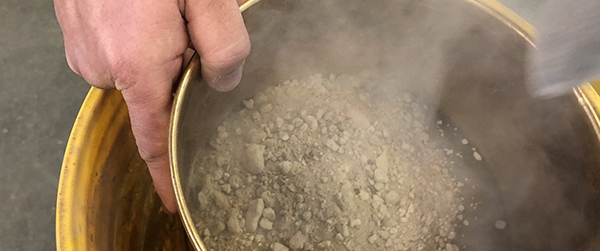Volcanic Ash in Southern Oregon Yields Sustainable Road Materials

The latest Small Starts study from the National Institute for Transportation and Communities (NITC) offers sustainable road building materials for rural infrastructure, from an unlikely source.
Approximately 7,000 years ago, the eruption of Oregon's Mt. Mazama blanketed the Klamath Basin region with a thick layer of volcanic ash. Matthew Sleep, an associate professor of civil engineering at Oregon Tech, investigated the use of this ash as a natural pozzolan for soil stabilization and unpaved roadway improvement. He found that the ash, prevalent in Southern Oregon, has the potential to be used for gravel roadway dust abatement.
Portland cement, the current industry standard, is a basic ingredient in concrete and mortar. A caustic material that causes chemical burns, it was first developed in the 19th century. It’s time for a new approach.
A sustainability analysis concluded that replacing portland cement with Mt. Mazama volcanic ash would reduce carbon dioxide emissions and embodied energy consumed during the construction process.
The scope of work for this Small Starts project, which serves as a stepping stone to the next phase of research, included measuring the shear strength of Mt. Mazama Ash. Further soil testing and laboratory analysis of the ash's other mechanical properties is a goal for future research, as is the development of a cost comparison between the use of Mt. Mazama Ash and other innovative soil stabilization techniques. The hoped-for outcome? A hyperlocal source of sustainable materials to support environmental stewardship in rural Oregon.
THE NEXT PHASE OF RESEARCH
A second phase of this research has been funded by NITC and is currently underway, in which Sleep is investigating ADA Accessible Trail Improvement with Naturally Occurring, Sustainable Materials. By determining a low cost, sustainable solution for improvement of ADA accessible trails, more people will have access and connectivity will increase in rural communities. It is anticipated that this study will provide direct guidance on the composition of a natural pozzolan slurry mix and application methodology to create ADA accessible trails.
SMALL STARTS FUNDING
Small Starts grants assist researchers (based at NITC partner universities) who are interested in transportation but have not had an opportunity to undertake a small project. The next RFP cycle for this grant will open August 1, 2018. Proposals for the next round of Small Starts funding will be due September 5, 2018.
To learn more about this and other NITC research, sign up for our monthly research newsletter.
This research was funded by the National Institute for Transportation and Communities, with additional support from the Oregon Institute of Technology.
RELATED RESEARCH
- Collaborative Regional Planning: Tools and Techniques for Teaching Collaborative Regional Planning to Enhance Livability and Sustainable Transportation
- Building Planner Commitment: Are Oregon’s SB 1059 & California’s SB 375 Models for Climate-Change Mitigation?
- Evaluating the Distributional Effects of Regional Transportation Plans and Projects
